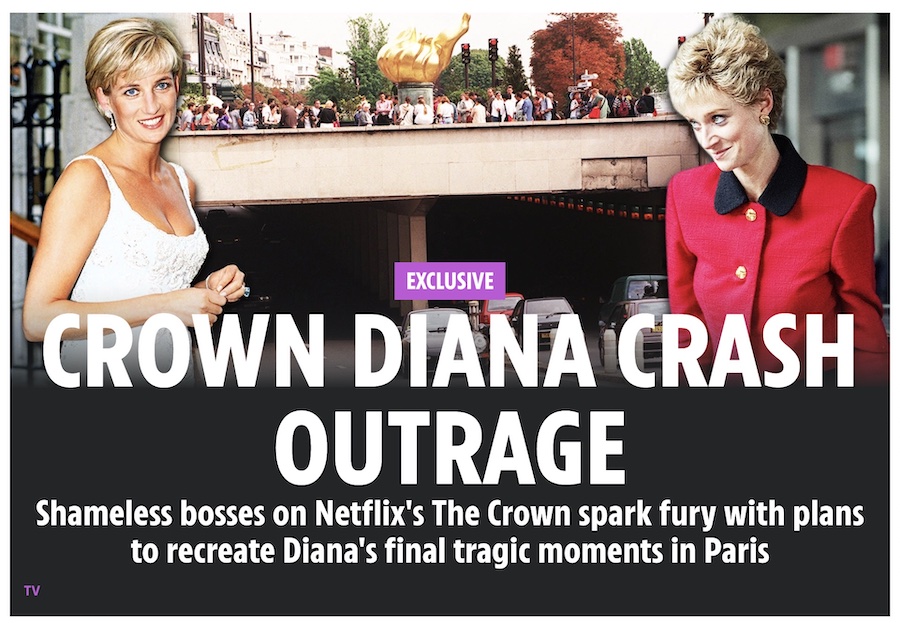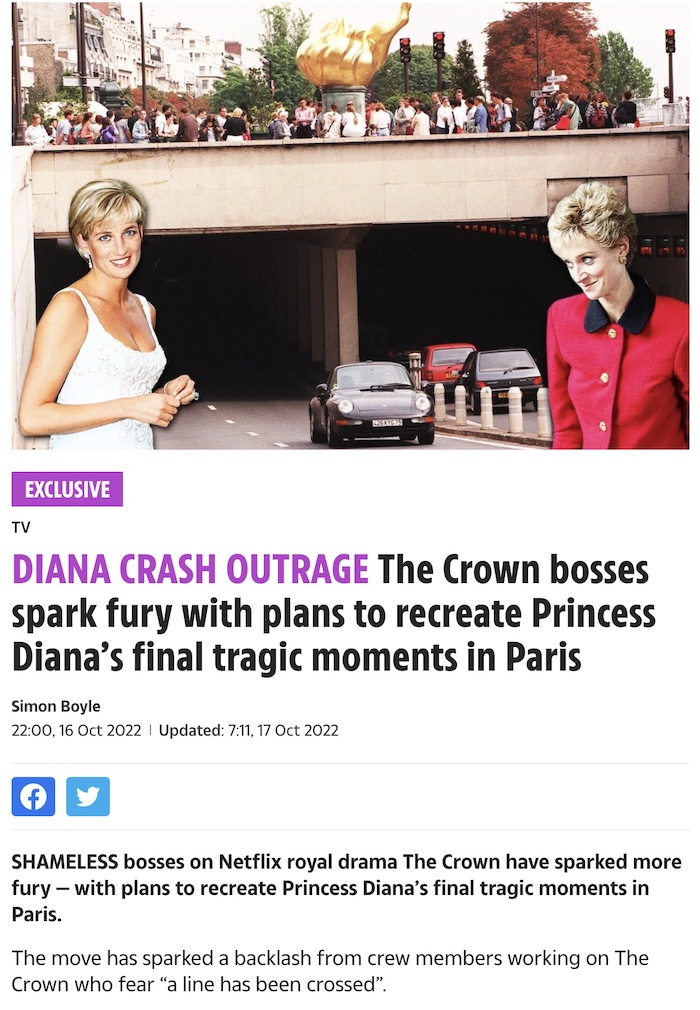Brit noun pile heds: "Crown" edition
« previous post | next post »
While traveling in the UK, Nancy Friedman spotted the tabloid headline "CROWN DIANA CRASH OUTRAGE" on the front page of The Sun.
https://twitter.com/Fritinancy/status/1582008092136734722
"Crash blossoms," as we've often discussed here on Language Log, are headlines that are so ambiguously phrased that they suggest alternate (comical) readings. (The headline that gave "crash blossoms" their name appeared in the newspaper Japan Today in 2009: "Violinist Linked to JAL Crash Blossoms." That referred to Diana Yukawa, a violinist whose father died in a 1985 Japan Airlines plane crash.) I'm not so sure this is a canonical crash blossom, since it's difficult to get even one plausible parsing from this headline, unless you're well-versed in the British journalistic tradition of "noun-pile heds," another frequent LL topic (see past posts here).
The headline from The Sun also appeared on the newspaper's homepage.
On the article page, the headline gets a bit simplified to "Diana Crash Outrage."
As becomes clear from the article, the "Crown" in the headline refers to the Netflix series The Crown. Season 5 is currently being filmed, and word has it the season culminates in the death of Princess Diana. So "Crown Diana Crash Outrage" should be parsed as something like "outrage over The Crown's depiction of Diana's crash." While "Crown Outrage" or "Diana Crash Outrage" might be somewhat understandable, grafting it all together into a four-noun pile-up lends extra opacity.
I'm struggling to find a crash-blossom-style alternate interpretation, but perhaps "crown" and "crash" could be read as transitive imperative verbs: "Crown Diana. Crash Outrage." Chris Waigl once described crash blossoms as "those train wrecks of newspaper headlines that lead us down the garden path to end up against a wall, scratching our head and wondering what on earth the subeditor might possibly have been thinking." Regardless of whether this headline provides any plausible garden paths, it's certainly a head-scratcher.


D.O. said,
October 17, 2022 @ 2:53 pm
My garden path was an attempt to interpret "Crown Diana" as some sort of proper name and then the whole headline was about an outrage about a crash of this mysterious object.
Martha said,
October 17, 2022 @ 5:05 pm
My interpretation was that something happened to make the king outraged about the crash all over again. (Well, really, the queen was my first thought, until I remembered it's the king now.)
I think it would have been perfectly clear if "Crown" had been italicized, but do they italicize headlines?
Viseguy said,
October 17, 2022 @ 6:57 pm
It took me half a second, but I did eventually decode it as "(The) Crown/Diana-Crash Outrage".
To The Sun: I'm available, at a reasonable hourly rate, to punctuate headlines for you.
J.W. Brewer said,
October 17, 2022 @ 8:33 pm
If you take "crown" as a verb instead of noun, which is the classic crash-blossom technique for generating alternative parses, the whole phrase reads as an imperative (since that's one of the few English syntactic constructions that are verb-initial and don't end with a question mark), and it's rather unclear who it is that's being directed to crown a diana-crash-outrage and how they might plausibly comply with that direction.
Philip Anderson said,
October 18, 2022 @ 5:15 am
Having heard of The Crown and it’s controversies, even though I don’t watch it, it was straightforward to expand. But I would have put a colon after Crown, which is not unheard of in headlines.
Fury, outrage, shameless, backlash: all words popular with journalists, and rarely used by the rest of us.